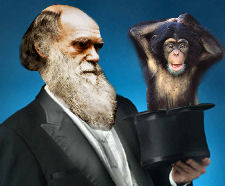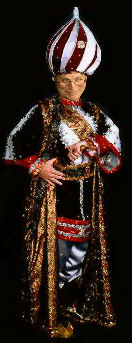Darwin's Trick
 Saturday, October 21, 2006 at 08:54AM
Saturday, October 21, 2006 at 08:54AM  Quote: “We learn thus that man is descended from a hairy quadruped, furnished with a tail and pointed ears, probably arboreal in its habits, and an inhabitant of the Old World.” Charles Darwin, in The Descent of Man.
Quote: “We learn thus that man is descended from a hairy quadruped, furnished with a tail and pointed ears, probably arboreal in its habits, and an inhabitant of the Old World.” Charles Darwin, in The Descent of Man.
Figure of Speech: epiphonema (eh-pih-fo-NEE-ma), the memorable summary. From the Greek, meaning “sound out upon.” Also reluctant conclusion, a figure of thought that conveys disinterest.
(Yes, Figaro just did that figure, but he feels compelled to do it again. )
In the current New Yorker, Adam Gopnik says today’s quote “may be the single most explosive sentence in English.” Darwin used it to kick the religious foundations out from under his own pious Victorian society. Yet the bearded old naturalist was buried with full honors in Westminster Abbey. How did he win a world-changing argument and emerge unscathed?
Now, pay attention, scientists. Your clumsy defense of evolution against the religious right could use some help from Uncle Charles. When it came time to introduce his fellow humans to their hairy ancestors, Darwin relied on a classical education steeped in the rhetoric of Cicero and Aristotle. Unlike today’s scientists, Darwin doesn’t state a hypothesis and then attempt to prove it. Instead, he saves his conclusion for the last. Twenty chapters of facts lead to a rhetorical punchline called an epiphonema.
Just as important, Darwin sounds not the least bit gleeful in relaying his disturbing news. He doesn’t say, “The foregoing evidence proves my point.” He says, “We learn thus…” He and his audience receive the shocking information together. Alas, his tone says. The facts give us no choice. Our forebears (sigh) were monkeys.
Rhetorical lesson for the day: You are more likely to win an argument when you don’t appear to win it.
Snappy Answer: “Thank God we live in the New World.”






